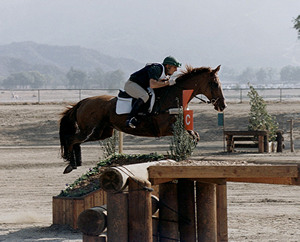Welcome to
Caber Farm
Onalaska, Washington – Area VII
 Caber Farm is centrally located between Portland, OR and Seattle, just minutes from Interstate 5 in Washington.
Caber Farm is centrally located between Portland, OR and Seattle, just minutes from Interstate 5 in Washington.
The farm’s 100 acres includes full cross-country courses from beginning novice through intermediate, a lighted indoor arena, an outdoor sand arena, three barns, with a total of 33 stalls, and plenty of room to ride throughout the woods and open fields.
The cross-country courses were designed by Derek DiGrazia of Pebble Beach, California, and built by Daniel Hauptman, John Camlin and Kyle Mosely, with plans for an advanced course in the very near future.
The resident instructor/owner of Caber Farm is John Camlin. John has been riding horses for over thirty-one years, with twenty-two of those years at the international level. He has competed at events such as Punchestown (Ireland) and Boekelo (Holland), and as a youth, has competed at the McClay Medal at Madison Square Garden. John has been long-listed and short-listed for the United States Equestrian Team and has trained with Jimmy Wofford, Jack LeGoff, Derek DiGrazia, Frank Chapot, Jimmy Williams and Barbara Worth.
 In addition to starting and training more than twelve advanced level horses and a multitude of intermediate level horses, John has also trained riders through four star level, including a Quarter Horse Youth World Champion in hunter under saddle. He starts and trains all his horses with patience and kindness and is a true horseman in every respect.
In addition to starting and training more than twelve advanced level horses and a multitude of intermediate level horses, John has also trained riders through four star level, including a Quarter Horse Youth World Champion in hunter under saddle. He starts and trains all his horses with patience and kindness and is a true horseman in every respect.
Caber is a Scottish word reflecting John’s Scottish heritage and comes from the traditional Scottish Highland Game Tossing The Caber dating back to the 16th century. The Caber Toss is a game of strength and skill which may have begun in the Scottish Highlands a long time ago when the forest was cleared to make fields. Small streams ran through the area. In order to cross these streams without getting their feet wet, the men would cut a tree and toss it end over end, trying to get it to land with one end on each bank. This tree would then be used as a bridge to cross over the stream. Those who could not toss their caber perfectly had to work with wet feet all day, which created a real incentive to perfecting the art of tossing the caber correctly the first time.
It is this striving for perfection the first time which is the foundation of the Caber Farm philosophy.